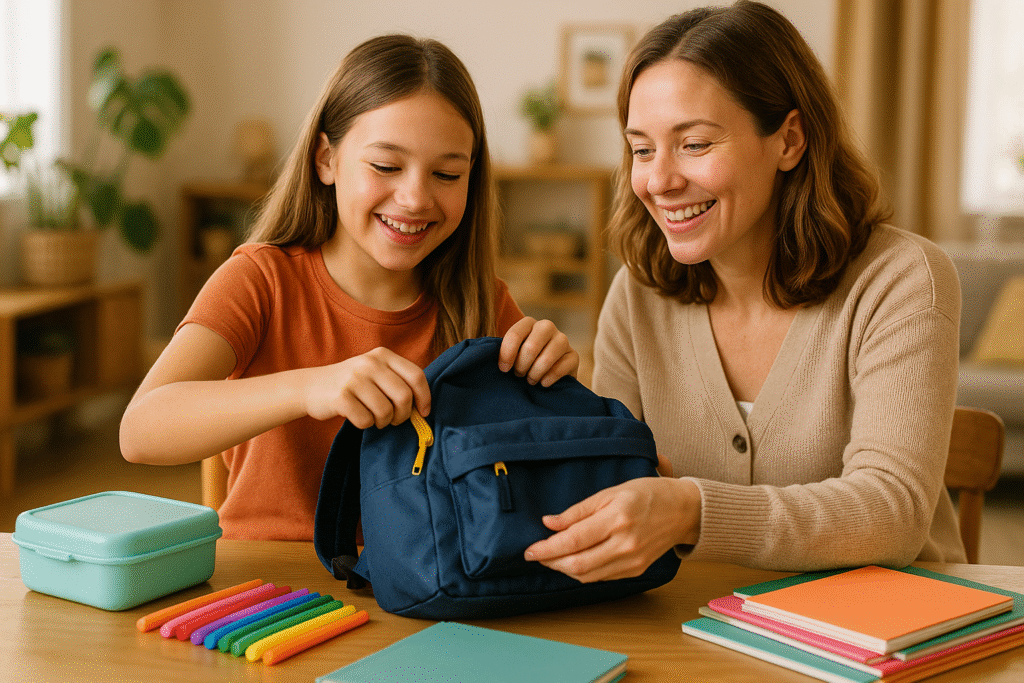5 Meaningful Things to Do With Your Daughter Before She Goes Back to School (to Build Confidence & Calm)
Back-to-school season isn’t just about new pencils and fresh notebooks—it’s about helping your daughter feel ready, confident, and excited for the new year.
Tweens (8–12) are at such an interesting stage: they want independence, but they also want to know you’ve got their back. A little preparation, a few thoughtful conversations, and some fun bonding activities can go a long way in helping her start the year strong—whether she’s heading into a busy classroom or learning from home.
Here are 5 expert-backed, confidence-boosting things you can do together before the first day.
1. Have a “School Day Deep Dive” Chat
Why it matters:
Tweens often have silent stressors they won’t bring up on their own—like hating the morning rush, feeling nervous about certain subjects, or being unsure about social situations. According to Dr. Becky Kennedy, when we create space for kids to talk openly, without judgment, they feel understood and empowered to handle challenges.
What to do:
- “What’s the best part of your school day?”
- “What’s one thing that could make your school day easier or more fun?”
- “If you could change one small thing about last year, what would it be?”
For homeschoolers: Instead of focusing on the structure of a traditional school day, talk about what parts of the week she enjoys most at home (e.g., morning lessons, hands-on projects, or reading time). Ask:
- “What makes learning at home fun for you?”
- “Is there a subject or routine we could tweak to make it even better?”
Listen first, then brainstorm small improvements—maybe a slower morning routine, a new planner, or a fun after-school ritual to help her decompress.
How this helps:
You’ll uncover what she actually needs—and she’ll feel like her voice matters. That sense of agency builds confidence and creates more buy-in for the week ahead.
2. Let Her Have a Say in the Plan
Why it matters:
Tweens crave independence, but they still need your support. David Yeager’s research on motivation shows that when kids have a sense of autonomy, they’re more likely to stay engaged and positive.
What to do:
- Create a morning plan together: What time does she want to wake up? How can mornings feel less rushed?
- Let her choose a few school essentials—maybe a backpack charm or a cool water bottle that feels like hers.
- For homeschoolers: Let her help design part of the weekly schedule or pick which experiment or project you’ll start with.
How this helps:
When she feels in control of small decisions, she approaches her day with confidence instead of resistance.
3. Talk About Food as Fuel (Not Just Lunch)
Why it matters:
Lunch is the mid-day energy booster—especially on those “tough” days. A balanced, healthy lunch can make a huge difference in how she feels, thinks, and gets through the afternoon. Experts from the American Academy of Pediatrics note that protein-rich, colorful, and whole-food lunches help with focus and mood regulation.
What to do:
- Brainstorm lunch ideas together. Ask, “Which foods make you feel happy and full of energy?”
- Make a simple lunch menu for the week so mornings are easier.
- Talk about basic nutrition—why certain foods help her brain and body perform better.
- Let her pack something fun with her meal (like a favorite fruit or mini snack) to look forward to. Want to take it up a notch? Find a healthy snack recipe online and make it together. Not only does it become a fun mini bonding session, but if she can make it herself next time, you’re giving her independence and a gentle intro to cooking and nutrition.
How this helps:
When she understands the “why” behind her lunch, it’s no longer just a meal—it’s fuel that helps her power through the day with energy and focus.
4. Make It a Sunday Confidence Ritual
Why it matters:
Kids thrive on routine because it creates predictability, which lowers stress and boosts confidence. Dr. Laura Markham (author of Peaceful Parent, Happy Kids) explains that rituals give kids emotional security—they know what’s coming and can mentally prepare for challenges. A Sunday evening ritual helps tweens shift from weekend mode to school-ready mode in a positive, empowering way.
What to do:
- Wardrobe Prep: Plan her favorite outfits for the week (let her choose, but guide her toward practical and confidence-boosting looks).
- Lunch + Snack Ideas: Brainstorm what foods will keep her energized through tough days—and maybe prep a fun snack together for Monday’s lunch.
- Bag & Homework Check: Take 10 minutes together to check her backpack, make sure all homework is done and packed, and confirm that no library books or science notebooks are hiding under the bed.
- If You Homeschool: Instead of a bag check, review the week’s lesson plan together, set out books and supplies, and pick a couple of “fun focus” activities (like a hands-on experiment or a creative project) that she can look forward to.
- Mini Planning Session: Look at her weekly schedule and let her talk about which days might be harder (PE? Science?)—brainstorm together how to make them easier or more fun.
- Affirmation or Goal for the Week: Create a mantra like, “This week I will try one new thing.”
How this helps:
A Sunday ritual sets the tone for the week. It reduces the Monday morning scramble, gives her a sense of control, and shows that preparation can be fun (not stressful). For homeschoolers, this prep makes the week run smoother and sets a positive tone for learning. Plus, it becomes your special time together each week—something she’ll look forward to.
5. Talk About the “What-Ifs” Before They Happen
Why it matters:
Whether it’s worrying about making friends, feeling overwhelmed by homework, or not having the latest tech like her peers, planning ahead helps her feel less anxious. Research shows that preparing for scenarios (a core part of CBT) reduces stress and increases problem-solving confidence.
What to do:
- Role-play: “What if you feel nervous in class?” or “What if you don’t understand something?”
- Together, create a list of small strategies (like taking a deep breath, asking for help, or writing questions down to ask later).
- For homeschoolers: “What-ifs” might look different—like feeling stuck on a tough subject or missing social time with friends. Discuss strategies such as taking a short brain break, calling a friend after lessons, or swapping a tough subject for something fun (then coming back to it later).
How this helps:
Instead of being blindsided by challenges, she’ll have a toolbox of responses ready to go. This proactive approach shifts her from reactive panic to confident problem-solving. Research in child psychology (including CBT techniques) shows that when kids rehearse scenarios, they feel more in control and less overwhelmed when those moments happen. It’s like giving her an emotional safety net—she knows exactly what steps to take, whether it’s pausing to breathe, asking for help, or trying again later. For homeschoolers, this preparation builds resilience and independence, essential skills for both learning and life.
Final Thoughts: Preparing Her Mind, Not Just Her Backpack
Back-to-school prep isn’t just about supplies or schedules—it’s about building your daughter’s confidence and resilience. Small steps like giving her a voice, planning lunches together, and creating a simple ritual can transform the way she feels about her school days.
Want to supercharge her confidence and curiosity this year? The Hey Smart Girl series is packed with fun, hands-on experiments that turn tricky science concepts into exciting, “I can do this!” moments. It’s not just about physics—it’s about helping her see that science (and even mistakes) are for everyone. Imagine her lighting up with pride as she masters experiments while you enjoy stress-free, ready-to-go lessons. It’s the ultimate way to keep her inspired, curious, and learning all year long.







